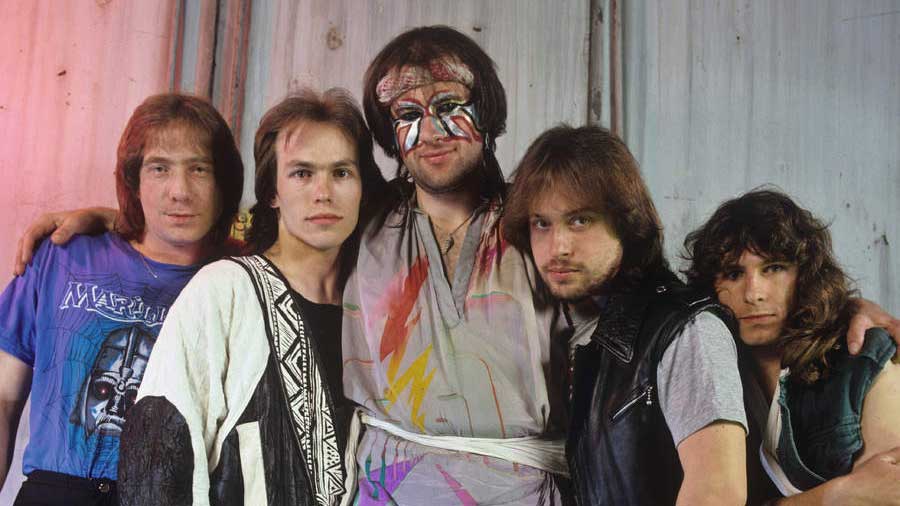"At one point an aggrieved producer threatened to attack them with a machete": Say what you want about Marillion's second album, but it was not easy to make
Buoyed by the success of Script For A Jester's Tear, follow-up Fugazi was a victim of extremely difficult second album syndrome

Select the newsletters you’d like to receive. Then, add your email to sign up.
You are now subscribed
Your newsletter sign-up was successful
Want to add more newsletters?

Every Friday
Louder
Louder’s weekly newsletter is jam-packed with the team’s personal highlights from the last seven days, including features, breaking news, reviews and tons of juicy exclusives from the world of alternative music.

Every Friday
Classic Rock
The Classic Rock newsletter is an essential read for the discerning rock fan. Every week we bring you the news, reviews and the very best features and interviews from our extensive archive. Written by rock fans for rock fans.

Every Friday
Metal Hammer
For the last four decades Metal Hammer has been the world’s greatest metal magazine. Created by metalheads for metalheads, ‘Hammer takes you behind the scenes, closer to the action, and nearer to the bands that you love the most.

Every Friday
Prog
The Prog newsletter brings you the very best of Prog Magazine and our website, every Friday. We'll deliver you the very latest news from the Prog universe, informative features and archive material from Prog’s impressive vault.
Marillion’s debut album, 1983’s Script For A Jester’s Tear, which had muscled its way into the Top 10, had turned them into one of the most talked-about new bands in the UK. Big things were therefore expected of the follow-up, not least from their label EMI. “We were riding on the back of Script, we’d done our first American tour, it was all wonderful,” says Fish, Marillion’s original singer and lyricist. “And then we hit Fugazi.”
The band’s second album, Fugazi was a lesson in how not to make a record. “We used up all the material we had on Script,” says keyboard player Mark Kelly. “We needed to come up with an album’s worth of material, and we pretty much had to start from scratch.”
Marillion’s approach to songwriting involved writing fragments of music and then trying to work out how to fit them together like a jigsaw, a taxing process for everyone involved. “We felt like we were under a lot of pressure to come up with an album’s worth of material,” Kelly continues, “and we weren’t making a very good fist of it, to be honest.”
By the time they entered Richard Branson’s £1,000-a-day Manor Studio in Oxfordshire with producer Nick Tauber in November 1983 to start recording, they still had only two-thirds of the album written. The next three months would see the band frantically trying to complete the record. They burned through several expensive studios, sometimes using two simultaneously to finish it off. At one point an aggrieved producer whose time they were eating into threatened to attack them with a machete.
Fugazi came in just under the wire. It was far from the disaster its painful creation suggestion. Assassing was a venomous rejoinder to those who mischaracterised Marillion as bloated prog copyists, Punch And Judy set a bleak tale of domestic abuse to a queasily upbeat tune, and the masterful title track remains a brilliant slice of shape-shifting 80s urban paranoia.
Released in March 1984, Fugazi peaked at No.5 in the UK. But their paymasters at EMI were looking at the balance sheet – the album had cost £120,000 to make but didn’t produce the massive hit singles they wanted. “It was like going into the bar and running a tab and having a fantastic party and never for one moment thinking at the end of the night you’d be given the bill,” says Fish.
Fugazi’s relative under-performance saw EMI putting Marillion on blast: deliver the goods next time, or you’re in trouble. Eighteen months later, they delivered Misplaced Childhood, a record that briefly turned them into unlikely pop stars and assured their future.
Sign up below to get the latest from Classic Rock, plus exclusive special offers, direct to your inbox!
“It’s a transitional album,” says Fish. “It could have been stronger in places. But we were young guys, for fuck’s sake. You just think: ‘This is fucking fantastic, we’re making albums and travelling the world, this is the life.’”
Dave Everley has been writing about and occasionally humming along to music since the early 90s. During that time, he has been Deputy Editor on Kerrang! and Classic Rock, Associate Editor on Q magazine and staff writer/tea boy on Raw, not necessarily in that order. He has written for Metal Hammer, Louder, Prog, the Observer, Select, Mojo, the Evening Standard and the totally legendary Ultrakill. He is still waiting for Billy Gibbons to send him a bottle of hot sauce he was promised several years ago.

